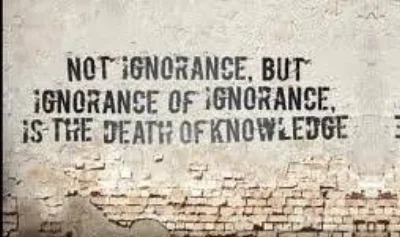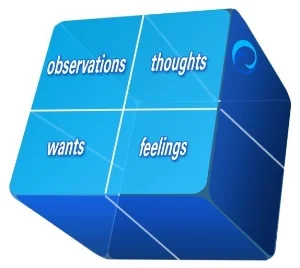Ignorant of Ignoring Ignorance? Or, Ignorance of Ignorance?
Ignorance is defined as "the state or fact of being ignorant: lack of knowledge, education, or awareness". Similarly, to be ignorant means to have a lack of knowledge, or a lack of comprehension.
To ignore means to refuse to acknowledge. Essentially, these all come from a similar root - to 'gno' is to know. And 'in-' means "the opposite of...". Yet, I'm not sure it's a clean distinction that 'ignorance' is the opposite of knowledge or knowing...
Most assessments of 'ignorance' definitions tend to have negative connotations. However, should they?
My intention with this post is to relate this to interpersonal communication - and oft discussed diagrams of "two-way communication" similar to the one I have illustrated below.
A Sender sends a message - e.g. encodes it through their own 'filters' with words, tone, body language, etc.
That message flows through a communication channel full of noise and interference (literal noise and interpersonal noise, power, cultural, etc.) - represented by squiggly orange and yellow lines through the diagram.
A Receiver receives the message - e.g. decodes it through their 'filters' (similar to above). Then delivers a feedback message, with a combination of words, tone, and body language - through a communication channel also full of noise and interference. The initial Sender, becomes a Receiver, and decodes the message through their filters.
Essentially this means that in one simple exchange:
Sender: "hey, how are you Receiver?"
Goes through two filters before received - These include ears, eyes, and feelings.
Receiver: "Good... had A heck of a weekend!"
Which then goes through two more filters- the now Receiver/ was Sender, and the now Sender/was Receiver - (plus the noise and interference) before being received by initial Sender (left side of diagram).
Some sort of mathematical equation could demonstrate for us how quickly this many 'filters' could skew the intentions and meanings of each message... is there not exponential increases in the potential for ignorance in this equation, with each exchange of messages; each utterance?
It might resemble a cargo ship leaving Vancouver destined for Japan, however if it is 1 degree off in it's navigation, the margin of error grows by the minute. The longer the voyage, the more off course the ship becomes, eventually ending out in Australia...
_ _ _ _ _ _ _
A few years ago, I opened a post with this diagram (below). A painting I did for a facilitation session for a local organization's board retreat to work through some thorny issues.
based on Sunni Brown "Doodle Revolution"
It's based on a diagram by Sunni Brown in her book The Doodle Revolution: The power to think differently (2014). She has a similar diagram in a 2009 blog post:
Some might argue that some of the most dangerous - yet most opportunity-filled situations would circulate around, and within: what we don't know. Or maybe most dangerously - what we don't know we don't know (it's the purplish pie piece above).
Some might also argue that proportions of 'what we don't know we don't know' and 'what we don't know' could ebb and flow in size and proportion more than spring tides on the north coast, or this spring, in much of Canada with numerous flooding rivers and relentless rains.
I recently came across the Routledge International Handbook of Ignorance Studies (2015) at the local university library. There is a 2015 New York Times opinion article mentioning the book: The Case for Teaching Ignorance.
"People tend to think of not knowing as something to be wiped out or overcome, as if ignorance were simply the absence of knowledge. But answers don’t merely resolve questions; they provoke new ones."
The Op-Ed also suggests "Educators should devote time to the relationship between ignorance and creativity and the strategic manufacturing of uncertainty" and that we should spend as much time on 'theories of knowledge' as we do 'theories of ignorance'.
On the front cover of the Routledge book is this pretend graffiti image:
In our current western-based societies, institutions and organizations seem obsessed with "evidence-based" decision making or "evidence-informed" - Yet, what is more important: (1) evidence that falsifies a theory; or (2) evidence that confirms a theory?
This opens a vast array of further questions - e.g. what scale of 'falsifying', or, 'confirming' - such as time, place, context, etc.?
_ _ _ _ _ _ _ _ _ _ _
I've recently completed a doctoral level course "Leadership and Project Management in Distance Education" (my fourth in the program) which is intended to explore "general leadership theory, issues in contemporary education leadership, leadership in distance and distributed education and training and special topics on leadership and project management, as they relate to educational technology, innovation and change."
Moving through the course, I found it critical to explore ignorance, along with scales and classifications of ignorance, especially within 'leadership theories', organizational studies, and most especially 'communication'. As there are few 'organizations', and little 'leadership' without communication. [more to come in future posts]
Most recently, upon completing the course I came across the book Mastering Civility: A manifesto for the workplace by Christine Porath (2016), as well as motivation expert Dan Ariely's most recent book Payoff: The Hidden Logic that shapes our motivations. Curiously enough, on Ariely's website, it explains that "Payoff investigates the true nature of motivation, our partial blindness to the way it works, and how we can bridge this gap."
Is not 'blindness' another way of stating 'ignorance'? (Ignorance hiding within a metaphor? - similar to Brown's "monstrously-large blindspots")
Which leads me back around to an area I spend a lot of time reading about and pondering - communication. And, not 'communication' as in the departments that are formed in organizations a la Communications dept - but interpersonal communications between folks in organizations, institutions, and life...
_ _ _ _ _
Every day we interact with a medley of individuals, utilizing either our voice, or our digital voice (e.g. email, text, Fbook posts, etc.). In a large proportion of these interactions we utilize 'interpretation' to try to decipher 'friend or foe'-type interactions (this is highly simplified, but evolutionarly-planted in our lizard brains).
Fortunately - or unfortunately - many of us, myself included, think we have 'knowledge' of what we are seeing, hearing, feeling within these interactions. However, reality is, much of what is going on, we are ignorant of. For example, we have much ignorance about what is, and may be going on in, for, and with the person across from us. What we tend to be experts at - is telling ourselves stories about what we 'think' might be going on. Worse yet, we act based upon those stories.
There are things that we know we don't know, there are things we don't know we don't know, and there are things we simply don't know. All ignorance.
Not necessarily the absence of knowledge, but simply: Ignorance.
_ _ _ _ _ _ _ _
Here is another sketch I did today to represent a simple two-way interpersonal communication exchange.
Sender on left encodes and sends message to Receiver on right - using word choice, inflected with tone and intonation, and animated with body language.
"Hey you, why are you wearing that brown hat?!"
The message flies through the ether wrapped in sender's intentions (both known and unknown - e.g. conscious and sub-conscious). These percolate and bounce through an environment with noise and interference (literal or figurative).
These run head-long into Receivers' filters who uses eyes, ears, and maybe heart (whatever this might mean), plus past experiences, knowledge(s)/ignorance(s), and otherwise - attempting to interpret the meaning of the message, Senders' intentions and meanings. All of this wrapped within both their own intrapersonal (within one) and interpersonal (between two or more) mush.
"What?! you gotta problem with brown hats!?!"
And off the interaction goes...
_ _ _ _ _ _ _ _ _
How do we ensure that we potentially put our ignorances front and centre in interpersonal interactions? For example, asking questions of clarification, active listening, curiosity?
Or how about our own, within ourselves, intrapersonal shenanigans?
Why not use tools such as the Awareness wheel?:
Or, Simon Fraser University (SFU) prof, Gervase Bushe (2010, 2013) proposes a tool called the "Experience Cube" (below). Bushe suggests in a 2013 article (with O'Malley) that research conducted at SFU:
...consistently indicates that about 4 out of 5 conflicts between people in organizations are due to stories they’ve made up about each other. Clear out the mush, understand each other’s experience, and the conflict goes away.
version from Bushe, Clear Leadership, 2010.
Bushe argues that we all have separate observations, thoughts, feelings, and wants within a scenario. The purpose of the cube is to start with making observations (top R), as if we were a camera or recorder capturing the moment. Then observe our thoughts, and keep moving clockwise through the cube, eventually identifying our 'wants'. Then rinse and repeat as necessary.
This is similar to the Awareness Wheel, which starts with neutral observations, then moves through thoughts, feelings, wants, then actions (e.g. 'Do').
In all of these 'Ignorance' and 'Knowledge' dance a slippery dance - within ourselves, and between ourselves. Yet, we may find things operate a little differently if we stop seeing 'ignorance' as a bad thing. We are far more ignorant then we are knowledgeable - personally and societally.
As the Routledge text on Ignorance Studies implores - to understand knowledge, we have to and must, increase our awareness (personally and collectively) of the importance of ignorance.
I intend to explore this further in future posts...
Thoughts?





